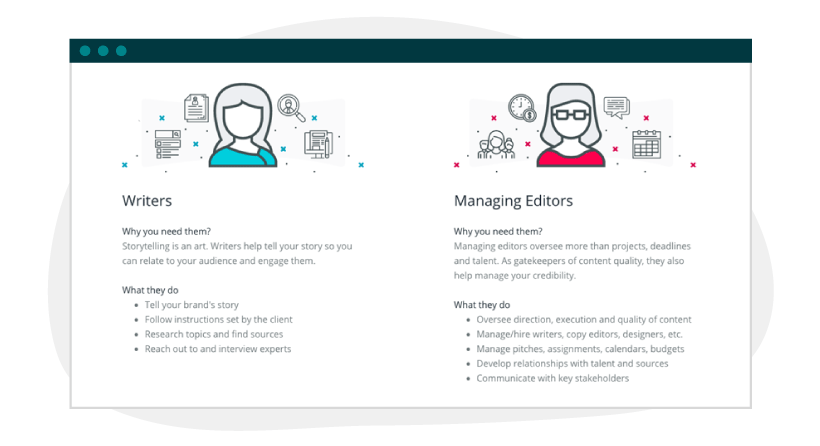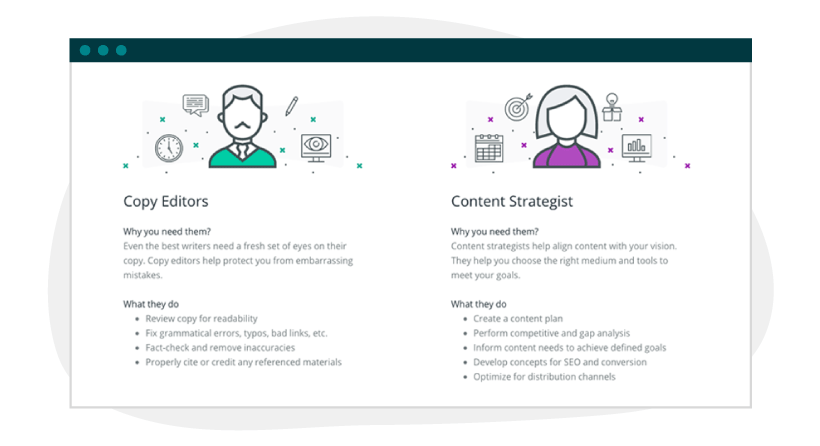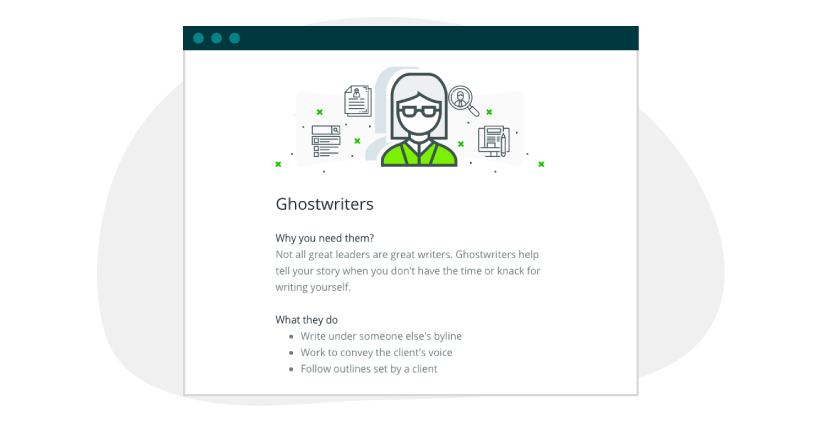Picture this. You’ve spent a year executing your content strategy, and it’s working. Blog traffic has grown and a recent ebook you published resulted in hundreds of new leads.
Sound impossible? It’s not. It’s happening for brands that leverage freelance talent to improve and grow their content creation efforts.
It’s nearly impossible to strategize and create great content at scale while juggling distribution, analytics, email marketing, social media, and so many other tasks. Freelancers can revolutionize the way you create content. These outsourced specialists allow you to produce more and better content, saving your business both time and money.
This article will break down how to find the best freelancers to match your needs and budget. Then, it will cover how to successfully work with and manage them to ensure the success of your content creation.
How Freelancers Help Boost Business
Most marketers understand the benefits of having brand content. It builds trust with audiences, nurtures sales leads, and boosts your brand authority. Yet just because you write content doesn’t make it engaging and conversion-driving.
So, how can you create high-quality content that builds brand awareness, brings in new leads, and solves customers’ problems? That’s where freelancers come in.
Freelancers can help your business in the following ways:
1. They take work off your plate
You might find yourself dedicating a little bit of time to all your tasks, rather than going deep to make sure they’re done right. Freelancers can take work off your plate so you can focus on things you need to do — or better yet — are passionate about.
Hire freelancers to complement what you’re already working on. Good ones can find ways to help you before you even realize it. They increase efficiency and offer guidance on how to optimize what you’re already working on.
Some of the most common projects you can outsource to freelancers are:
- Audience personas
- Blog posts
- Case studies
- Copy writing and editing
- Customer interviews
- Ebooks and resource guides
- General web copy
- Landing pages
- Content and SEO audits
- Email or newsletter copy
2. They offer the expertise you don’t have
You’re not an expert in everything. Sometimes it’s easier and more cost-effective to outsource your content to someone who is. The right freelancer can bring specialized expertise to the subject you’re writing about. That can ensure you create content that builds your brand’s authority and thought leadership.
3. They are more economical than full-time employees
Some freelancer rates may look daunting. And you may not be sure you have that kind of budget. Here’s the thing: Freelancers are a lot cheaper than full-time employees. If your company hires someone full-time, they’re not only responsible for a salary but also taxes and benefits.
The beauty of freelancers is you use them whenever you need them. Dole work out as needed in an à la carte fashion. It can save your brand a lot of money, as opposed to keeping someone on a full-time salary
4. They are the cream of the crop
Having to “prove” themselves to new clients helps freelancers produce their best work on a regular basis. “[It] encourages me to stay on top of my game, fresh and tuned in to what’s going on in the digital world,” says freelancer Sarah Petraglia.
Freelancer James Durston also remarks:
“The freelance marketplace is, by its very nature, highly competitive. Freelancers are constantly in fear of losing out on jobs and income to other freelancers. They have to pitch for every job with no guarantee of the outcome, and even once they win an assignment, often have few resources should the client pay late, not pay at all or ghost them. All this means is that freelancers are incentivized to do as good a job as they can, each and every time. Compare this to the employee, who gets paid, often much better than a freelancer, at the end of every month no matter how much or how well or how badly they did.”
How to Find the Right Type of Freelancer
1. First, know what you want
As of right now, there are 73.3 million freelancers in the U.S., believe it or not. But just because there are a lot of freelancers doesn’t mean they’re all good. How do you sift through the masses to find those “golden creators”? The first thing to do is start by knowing what you want…
2. Discern what type of content needs to be produced
Freelancer writers all write, sure, but they specialize in specific areas. Figure out what your real needs are in the content production cycle. Do you need help with blog creation, management, promotion, or editing?
These are a few of the different types of freelance talent out there who have varying abilities:
3. Decide what level you are comfortable with
Many brands are happy to hire someone green as long as they’re good with words. These freelancers are less expensive but require more time training.
Answering these questions will help you determine what level of expertise to hire:
- Does my freelance writer need to have experience in my industry?
- Can I afford premium freelance writers?
- Do I need help with developing content topics?
- Do I need someone to help with SEO and keyword research?
Where to Find Freelancer Writers
Once you’ve determined the type of freelance writer you need, it’s time to find them. These are common routes to source freelancers:
1. Ask for referrals.
Ask colleagues, business acquaintances, and existing contractors for referrals. This might be a shot in the dark, but referrals are always a golden source. Be specific about what and who you need during the ask.
2. Read your favorite blogs and approach writers directly.
Look at who’s writing on your favorite industry blogs and assess which voices you like. Many blog posts are written by freelance writers, and with a quick search, you can find them and contact them directly.
3. Post within vetted talent networks instead of job boards for randos.
Job boards are a total mixed bag. Although they can help you source a large number of writers, you may have to do some serious digging. If you’re taking this approach, you have to be willing to sift through the less-than-desirable writers to find the good ones. And even then, you won’t a have platform where you can collaborate together.
If you want to skip all that legwork, feel free to use our Talent Network. With it, we can match you with the talent that’s exactly the right fit for what you need. You can even go a step further and use our managed content creation services. That’s where we build fully managed freelance teams to help you simplify and scale your content creation all in one platform.
Get to Know Your Freelancers
Many in-house marketers know they need help, but they’re not sure where freelancers fit into the mix.
Follow these steps to properly vet freelancer talent:
1. Read their previously published work
Any freelance writer who’s worth hiring will have published work online. Read their content to get a good idea of their style, what industries they write about, if their content is easy to read, and if you like their voice. Reading their previously published work will help you figure out if they’re worth contacting.
Once you’ve created a ClearVoice account, check freelancers out in the Talent Network. If you’re looking at hiring a particular freelancer, plug their name in. You’ll find a CV Portfolio for the freelancer, and see samples of their published work and specialties. You can also search by content type, subject, and role.
Although a freelancer will have published work online, they may have additional ghostwritten pieces or other relevant samples to show. You can always ask them for specific samples, such as ones from your industry or directed at your target audience.
2. Check them out on social
While you don’t have to Facebook-friend a potential freelance writer, it’s a good idea to check out their social profiles, especially on LinkedIn. You can sense their level of professionalism and read up on what they’re passionate about. You can also view their recommendations, endorsements, and clients listed on social profiles.
3. Pay for a trial piece
Ask freelancers to complete an assignment and see how they do. And, yes, the assignment should be paid.
4. Interview them
When you’re interviewing a freelancer, make sure you have answers to the following questions to gather intelligence on their strengths and weaknesses:
- What industries do you specialize in?
- How do you deal with writing about things you’re not an expert in?
- What kind of writing do you do most often?
- How would you go about doing research for a new piece of content?
- Do you have experience interviewing experts and turning them into stories?
- What’s your philosophy about what makes content great?
- Do you incorporate SEO into your work?
- What do you charge? Do you have any minimums?
- Do you require a deposit?
- How many revisions are included in your rates?
- How much lead time do you need before completing a piece?
- What happens if I don’t like the work you deliver?
- What can I give you to make this job easier and give it the greatest possible chance of success?
Budgeting for Freelancers
How can you effectively budget for freelance writers? First, you need to figure out how they charge and then balance what you want with what you can afford.
How do freelancers typically charge?
Some freelancers prefer to charge by the project, while others charge by the hour or word.
You’ll also pay more depending on what you want. If you need a freelancer to do heavy research, conduct interviews, provide supporting images, or additional time-consuming tasks, be prepared to shell out more cash. There are additional variables that determine pay. Will the freelancer turn in clean drafts that barely need edits? Will the freelancer share the finished product on their social channels? Is it ghostwritten or bylined? This all has an impact.
Are expensive freelancers really worth it?
In general, there are two guiding principles when it comes to paying top-tier freelancers here:
1. You get what you pay for
As you’re searching for freelance writers, remember that if you want content that shines, you should invest in writers who have the experience and writing skills you need.
If you want to find someone who can write an article for cheap, you can find them, but you’re likely to spend a long time editing their work, and they’re unlikely to have any clout on social media.
2. Hiring (even expensive) freelancers is almost always cheaper than hiring an in-house employee
When freelance rates seem expensive, check yourself. How much would you be paying a full-time employee? Remember what we stated above — your company is not on the hook for providing benefits or long-term work.
When you see freelance writing rates, you might be surprised at the expense, but these writers can provide a ton of value to your business. Their ability to write well — and to your audience — can make your content shine and end up saving you money in the long run.
Long story short, invest in good talent.
What if You Don’t Have a Large Budget?
If the marketing budget has already been allocated, and there isn’t a huge amount of room for content marketing, you’ll have to go lean. But fear not — you can accomplish a lot with a small budget.
First, strategize. Successful teams have their plans written down, even if it’s a one-person team on a small budget.
Then, figure out what you can get from your budget. If you only have $1,000 to spend each month, your freelancers can offer ideas on how to best optimize that spend.
How to Successfully Work with Freelancers
The best freelancers are not ones you hire for a project, only to say goodbye when it’s complete. When you work with regular freelancers, they will know your brand inside and out — and feel like a part of your team. Yet, you don’t get these kinds of freelancers unless you’re deliberate about how you work with them.
Here are a few tips to forge successful freelancer relationships:
1. Get them up to speed
Be careful about how you onboard freelancers. Give them an editorial style guide, take the time to create assignment briefs, and have a process in place for effective communication.
How to create an editorial style guide:
Sometimes, marketers don’t want to hire freelancers because they feel it will be impossible to get them up to speed. But you don’t have to spend a lot of your precious time trying to onboard freelancers. Instead, develop a style guide to pass off to any new freelancer.
It will help them understand your expectations, editorial tone, audience, grammatical nuances and goals.
Your style guide should include:
- Info about marketing personas, target audience and customer base
- Information on voice and tone
- Formatting and grammatical preferences
- Lists of competitors not to reference
- List of favorite sources to reference
- Any majors do’s and don’ts
- Sourcing and keyword preferences
[Get more tips on what to include in your style guide from Content Marketing Institute.]
2. Set your expectations
The freelancer works for you, so it’s your job to set expectations around what you want. Are you flexible or rigid on due dates? Do you expect to hire the freelancer for one project, or do you have ongoing work for them?
3. Understand what freelancers want from you
Just because freelancers don’t work in your office doesn’t mean they don’t want a lasting relationship. In fact, freelancers are much more motivated when they feel connected to the teams they’re working with.
Freelancers want to feel valued and respected. If you start treating them as though they are suppliers, they will quickly begin to feel undervalued and overworked.
4. Use a platform for communication
No one should be trying to manage content creation and distribution via email and Google or Word docs. It’s a poor, antiquated system compared to what’s available today. It’s unwieldy and clumsy, and you can’t grow at scale. With a content marketing platform, you can scale any content initiative with ease and collaborate with the world’s top freelancers.
- Pro tip: With ClearVoice, you can do everything from one handy platform — plan, hire, collaborate and publish. Use it to manage all of your freelancer relationships and chat with them directly. Use a consolidated suite of content creation features so you don’t have to purchase or juggle separate tools.
5. Learn how to deal with freelancer feedback, edits and revisions
If you’re happy with a freelancer’s work, make sure to tell them. You may be a great client to work with, but most freelancers have seen their fair share of difficult people. If things aren’t going well, you need to be honest and straightforward.
Most freelancers are open and accepting of edits. Even so, sometimes editors change really minor things, send it back for reviews, and then do it again and again. The process takes forever. It’s always better to simply fix small things yourself and use a platform that easily allows you to collaborate and track edits.
Time to Level Up
As an in-house marketer, you have a lot of responsibilities. The good news is you don’t have to do it all yourself. Freelancers can offer a hand when you need it most, and their individual expertise can shape your content. We should know — we’ve built our entire company around connecting freelancers with people like you.
Discover our solutions or connect with a specialist to learn how we can help you harness the power of freelancers to take your content creation and production to the next level.










